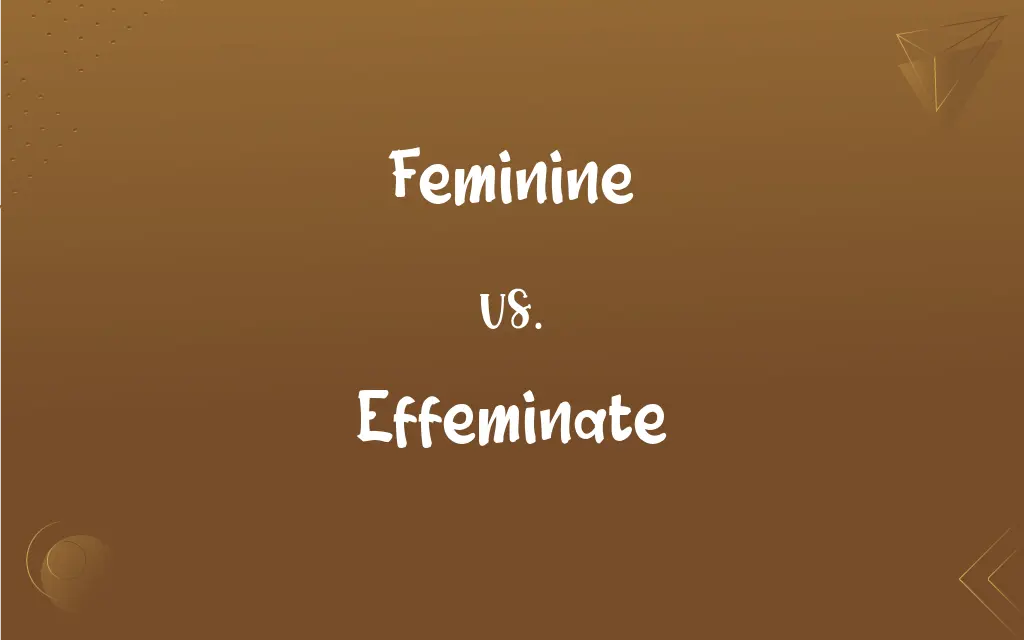Feminine vs. Effeminate: What's the Difference?
Edited by Aimie Carlson || By Janet White || Updated on November 13, 2023
Feminine describes qualities traditionally associated with women, while effeminate refers to a man displaying characteristics considered typical of women.

Key Differences
Feminine attributes or behavior are those traditionally linked to women or girls, such as gentleness and empathy. Effeminate, on the other hand, specifically describes a man who exhibits traits or behaviors culturally associated with women, often implying excessiveness in these traits.
The term feminine is broadly applicable to any person, object, or behavior that exhibits qualities traditionally ascribed to women, without any negative connotations. In contrast, effeminate is often used pejoratively and is narrowly applied to men, suggesting an unmasculine appearance or demeanor.
Feminine qualities can be embraced by anyone as a positive expression of their personality or style, celebrating traditional womanly attributes. Effeminate, however, is frequently used to criticize or undermine a man's masculinity, suggesting a deviation from traditional male norms.
The concept of feminine encompasses a range of behaviors and traits considered typical or appropriate for women in a given culture. Effeminate usually implies a visible or noticeable display of characteristics by men that society deems feminine, often with an implication of excess or inappropriateness.
While feminine is a neutral or positive term, celebrating womanliness in various forms, effeminate carries a stigma, often used to challenge or question a man's adherence to traditional gender roles.
ADVERTISEMENT
Comparison Chart
Definition
Qualities traditionally associated with women
A man displaying characteristics considered typical of women
Connotation
Neutral or positive
Often pejorative
Application
Broad, can apply to anyone or anything
Narrow, specifically refers to men
Cultural Perception
Celebrates traditional womanly attributes
Implies deviation from traditional male norms
Implication
Embracing womanliness
Challenging traditional masculinity
ADVERTISEMENT
Feminine and Effeminate Definitions
Feminine
Exhibiting characteristics traditionally attributed to women.
The decor of the room was distinctly feminine.
Effeminate
Displaying qualities in a man that are more often associated with women.
His effeminate style stood out in the conservative community.
Feminine
Relating to the female gender.
The novel explored the complexities of feminine identity.
Effeminate
Effeminate describes a man with traits considered typical of women.
His voice had an effeminate tone.
Feminine
Pertaining to women or girls.
She played a vital role in feminine health advocacy.
Effeminate
A man exhibiting characteristics or behaviors culturally deemed feminine.
He was unfairly criticized for his effeminate mannerisms.
Feminine
Feminine refers to qualities associated with women.
Her style was elegant and feminine.
Effeminate
A man showing an excessive or deliberate display of womanly traits.
His effeminate gestures were a topic of discussion.
Feminine
Having qualities or an appearance traditionally associated with women.
The floral fragrance was particularly feminine.
Effeminate
A derogatory term for a man perceived as overly feminine.
The character was portrayed as effeminate for comedic effect.
Feminine
Of or relating to women or girls.
Effeminate
Having or showing qualities or characteristics more often associated with females than males; unmanly
"gentle, kind, effeminate remorse" (Shakespeare).
Feminine
Characterized by or possessing qualities traditionally attributed to women, such as demureness.
Effeminate
Exhibiting behaviour or mannerisms considered typical of a female; unmasculine.
Feminine
Effeminate; womanish.
FAQs
Is being feminine exclusive to women?
No, while feminine traits are associated with women, they can be embraced by anyone.
Can objects be described as feminine?
Yes, objects can be described as feminine if they possess qualities traditionally linked to women.
Does effeminate imply a negative judgment?
Yes, effeminate often carries a pejorative connotation, especially in traditional contexts.
Is effeminate used to describe women?
No, effeminate is specifically used to describe men with traits considered typical of women.
Is effeminate an outdated term?
The term effeminate is considered outdated or derogatory in many modern contexts.
Can a man be feminine without being effeminate?
Yes, a man can exhibit feminine traits without being labeled effeminate, which often implies excess.
Are feminine qualities innate or learned?
Feminine qualities can be a mix of innate characteristics and culturally learned behaviors.
Are feminine qualities considered positive?
Generally, feminine qualities are viewed positively or neutrally, celebrating womanliness.
Can effeminate be a self-identification?
While less common, some men may self-identify as effeminate without negative connotations.
Can feminine traits be empowering?
Yes, embracing feminine traits can be empowering and affirming for individuals.
Are there positive ways to describe effeminate men?
Positive descriptions focus on their individuality and authenticity, avoiding stereotypes.
Does feminine imply weakness?
No, feminine traits do not inherently imply weakness; they represent a range of qualities.
Can fashion be described as feminine?
Yes, fashion styles can be described as feminine if they align with traditional female aesthetics.
Is it problematic to call a man effeminate?
It can be problematic if used in a derogatory way or to enforce gender stereotypes.
How has the concept of being feminine evolved?
The concept of being feminine has become more inclusive and diverse over time.
Is it acceptable to use effeminate to describe someone?
Caution should be exercised as it can be offensive, depending on context and intention.
Does society's view of effeminate men change over time?
Yes, societal views on gender expression, including being effeminate, evolve over time.
Do feminine qualities vary across cultures?
Yes, what is considered feminine can vary widely across different cultures.
How do cultural differences affect perceptions of effeminate men?
Cultural norms significantly influence how effeminate men are perceived and treated.
About Author
Written by
Janet WhiteJanet White has been an esteemed writer and blogger for Difference Wiki. Holding a Master's degree in Science and Medical Journalism from the prestigious Boston University, she has consistently demonstrated her expertise and passion for her field. When she's not immersed in her work, Janet relishes her time exercising, delving into a good book, and cherishing moments with friends and family.
Edited by
Aimie CarlsonAimie Carlson, holding a master's degree in English literature, is a fervent English language enthusiast. She lends her writing talents to Difference Wiki, a prominent website that specializes in comparisons, offering readers insightful analyses that both captivate and inform.































































